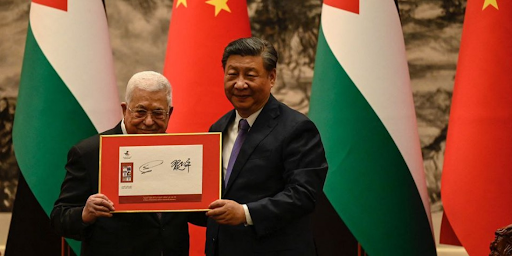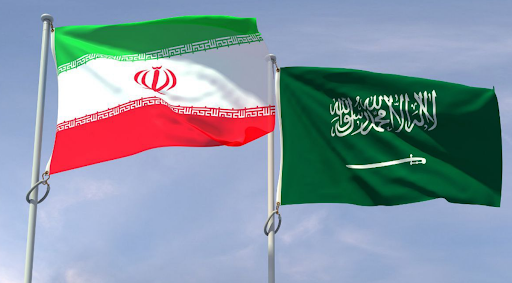Meeting the Palestinian president, China's president, Xi, calls for a Palestinian state to become full member of UN.
Chinese President Xi Jinping reiterated to Palestinian leader Mahmud Abbas on Wednesday his call for a state of Palestine to become a "full member" of the United Nations, state media reported.
The Palestinian President arrived in Beijing, on Monday, on his fifth official visit, which will continue until Friday.
The Chinese president told his Palestinian counterpart at a reception in the Great Hall of the People that China "is ready to strengthen coordination and cooperation with the Palestinian side, in the face of a century of global changes and new developments in the situation in the Middle East."
He added, "Today, we will jointly announce the establishment of a strategic partnership between China and Palestine, which will represent an important milestone in the history of bilateral relations."
Abbas is holding talks with senior Chinese leaders, including Premier Li Qiang, where the two sides' discussions will discuss ways to strengthen relations and confront the "long-term challenges" of the Israeli occupation of Palestine.
It is noteworthy that the two presidents signed a card issuing a Palestinian stamp issued on the occasion of the 35th anniversary of Chinese-Palestinian diplomatic relations.
A spokesman for the Chinese Ministry of Foreign Affairs, Wang Wenbin, said in a regular press conference, Friday, that “President Abbas is an old friend of the Chinese people,” pointing out that he is the first Arab head of state that China has received this year, and that this embodies the “high level of Chinese-Chinese relations.” Traditionally good Palestinian.
Winbin affirmed that "the Palestinian issue is the core of the Middle East issue, and affects peace and stability in it, and international justice and justice."
President Abbas expressed his appreciation for China's agreement to join the State of Palestine as a dialogue partner in the Shanghai Cooperation Organization, pending the approval of other member states.
And he considered that "these regional gatherings and similar ones are an opportunity to strengthen relations, and for the peoples and countries of the world to have a fair opportunity for development and progress, away from manifestations of domination and exploitation."
In April's UNSC meeting, China representative called for a new approach to solving the Palestinian question. In his remarks at a meeting of the Security Council, Zhang Jun, China's permanent representative to the United Nations, stressed the importance of upholding fairness and justice on the Palestinian issue.
He said, "What is lacking in resolving the Palestinian issue is not a grand plan, but rather a living conscience to establish justice. The fulfillment of the Security Council's responsibilities does not depend on blatant slogans, but on concrete measures."
"On issues related to the future and fate of the Palestinian people, no party has the right to use the veto," Zhang added.
Xi expressed Beijing's position during a summit with Arab countries in Saudi Arabia in December, although the latest call comes as the Asian powerhouse works to strengthen its role as mediator in the Middle East.
Xi met Abbas during the December trip and pledged to "work for an early, just and durable solution to the Palestinian issue".
Beijing has since positioned itself as a mediator in the Middle East, brokering the restoration of ties between Iran and Saudi Arabia -- rivals in a region where the United States has for decades been the main powerbroker.
The Saudi-Iranian relations have improved since the China sponsored agreement. Foreign Minister of Saudi Arabia Faisal bin Farhan Al-Saud will travel to Tehran on Saturday for talks with senior Iranian officials.
The top Saudi diplomat and his delegation will visit Tehran on June 17 to hold a series of talks with Iranian officials.
Sources had reported earlier that the embassy of Saudi Arabia in Tehran will reopen during the ministerial visit to Iran.
The foreign ministers of Iran and Saudi Arabia held a meeting in South Africa in early June to weigh plans for the full restoration of relations and broaden regional and economic cooperation between Tehran and Riyadh.
After several days of intensive negotiations hosted by China, Iran and Saudi Arabia clinched a deal on March 10 to restore diplomatic relations and reopen embassies and missions after seven years of estrangement.
******
Commenting on these developments, some media outlets and think tank analysis sites highlighted the geopolitical changes occuring since the start of the war in Ukraine. "The United States of America is lagging behind while the Middle East is embracing a new geopolitical era," said the Responsible Statecraft magazine, in a report.
"As the region progresses towards a multipolar system, Washington must promote more cooperation and economic development," the magazine said.
It added, "Amidst the reopening of Iranian and Saudi diplomatic missions after a 7-year hiatus, symbolizing their official rapprochement and the changing geopolitical dynamics in the Persian Gulf, US Secretary of State Anthony Blinken arrived in Riyadh last week with an old agenda."
The magazine commented, "Washington's failure to adapt to the new regional realities left it isolated, as its policies no longer resonate with its partners in the region."
And while "the United States remains deeply invested in the region for the foreseeable future, its policies have become the main impediment to diplomatic engagements, as well as economic development and integration in the broader Middle East," according to the magazine.
For example, the US administration implicated the Gulf in the war on Yemen, and it, however, made it clear that it was "not ready to solve it," according to Responsible Craft.
Likewise, “the absence of the United States in recent regional developments has provided opportunities for other global actors to assert their influence and enhance multilateral cooperation,” as the upcoming summit between Iran, the GCC and China in Beijing and the third meeting of the Baghdad conference later this year will provide “multiple avenues.” parties for dialogue and cooperation.
It is worth mentioning here that the United States will be absent from both events, which further highlights its isolation and diminished influence in the region.
Accordingly, the magazine concluded, "The changing dynamics and the emergence of alternative centers of power necessitate a recalibration of US policies in line with new geopolitical shifts throughout the Middle East."
She made it clear that this can be achieved by adopting a multipolar system and promoting economic development, and Washington should allow the region to further explore these diplomatic avenues and not hinder them.
Similarly, the European electronic magazine "Modern Policy" dealt with the issue of political transformations in what it called "the era of self-help in the post-American Middle East," stressing that the Gulf states will seek to form their foreign alliances based on their interests in the region.
The magazine explained that the US's relations in the region are not only with Saudi Arabia, but also with all Arab countries in the Gulf, noting that these relations today are "far from their golden years."
And she stressed, in the context, that if the countries of the region cannot see a role for the United States in stabilizing and maintaining stability, and if they cannot obtain a real American contribution to their security, then of course they will have to search for other potential partners.
She pointed out that the new isolation of the United States had dire consequences for the American leadership in the Middle East, which led to a great vacuum in its authority, which it tried to ensure its expansion in the region.
The magazine talked about Russia's efforts to fill this void in countries such as Syria and Libya, in addition to the efforts of regional powers such as Iran, Saudi Arabia, the UAE and Turkey to exercise greater influence within their areas of influence.
Relations between the United States and the countries of the region deteriorated almost globally, as a result of the United States ignoring the influence of local powers, for a period of time, in addition to its failure to realize the need for urgent intervention to repair these relations.
Also, China's work in the region as a mediator comes at the expense of the American role in it, especially since Beijing succeeds in reconciling the opponents in the region and putting an effective end to the conflicts in it, unlike the United States, according to the magazine, especially since it refrains from imposing political conditions on Middle Eastern countries during reconciliation efforts.








































